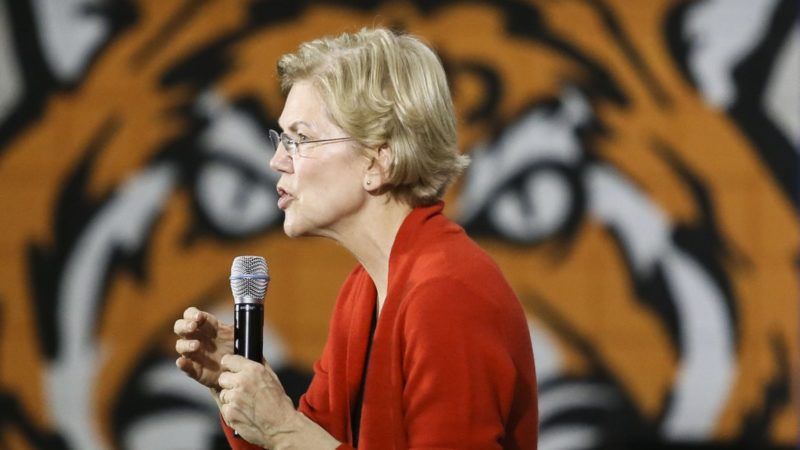Elizabeth Warren Wants To Make It a Crime To Give Out Fake Info About Voting
When politicians call to punish “disinformation,” we should worry about what that definition encompasses.

The good news about the latest campaign plan by Sen. Elizabeth Warren (D–Mass.) to make "big tech" the whipping boy for all our social strife is that it's not as horrifyingly bad as this CNBC tweet suggests:
Elizabeth Warren proposes criminal penalties for spreading disinformation online https://t.co/7tUD3dvDxq
— CNBC (@CNBC) January 29, 2020
Warren's plan does not go so far as to suggest criminal penalties for everything the government declares to be "disinformation," fortunately. But she does propose criminal and civil penalties for anybody who attempts to spread false information about the voting process. This comes directly from her plan released today to "Fight Digital Disinformation." Here's her actual proposal (emphasis hers):
Push to create civil and criminal penalties for knowingly disseminating false information about when and how to vote in U.S. elections: Voter suppression efforts of any kind offend basic American values. In both the 2016 and 2018 elections, online disinformation sought to depress voter turnout by telling people they could vote via text, giving people the wrong date for election day, and more. I will push for new laws that impose tough civil and criminal penalties for knowingly disseminating this kind of information, which has the explicit purpose of undermining the basic right to vote.
That's the only part of her plan that calls for criminal penalties for speech. It's still bad and wrong, but not as awful as it could be. Warren links to a report from the Brennan Center about Russian-led online suppression campaigns that aren't just about deceiving voters but also encouraging them to "boycott" elections. That's not deception. That's a position—an opinion attempting to persuade. Would that also be a crime? That would be a problem here at Reason, given that Katherine Mangu-Ward regularly attempts to convince Americans that voting isn't actually all that important and our individual votes don't matter.
The rest of Warren's proposals are attempts to blame social media companies for not banning or punishing people for engaging in disinformation campaigns online and encouraging to do more and to both share more information and data between social media platforms in order to track disinformation campaigns, while also at the same time calling for them to protect users' privacy. And she'd like to see social media platforms do a better job of labeling content that is produced by state-owned media outlets. Warren is presenting this crusade as a boon for public discourse and democracy rather than a potential tool for government to control speech they don't like.
It's particularly rich coming from Warren, given that she's currently being accused of pushing a disinformation campaign that rival candidate and Sen. Bernie Sanders (I–Vt.) privately told her that Americans wouldn't elect a woman president. Sanders insists he said no such thing. Warren's campaign is itself a reminder of the dangers of allowing powerful politicians to define what is and is not "disinformation" under the law.
Read Warren's plan here.


Show Comments (56)